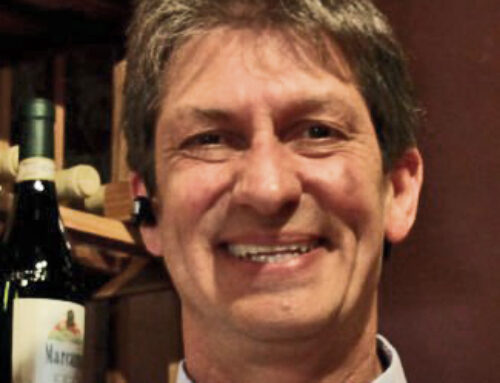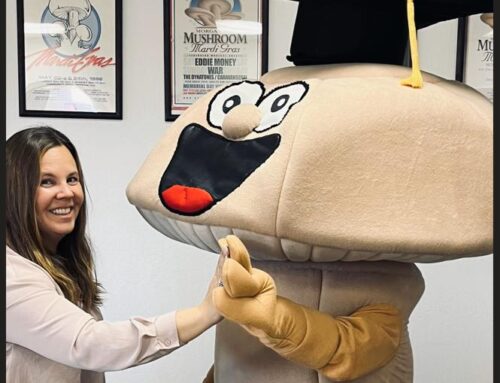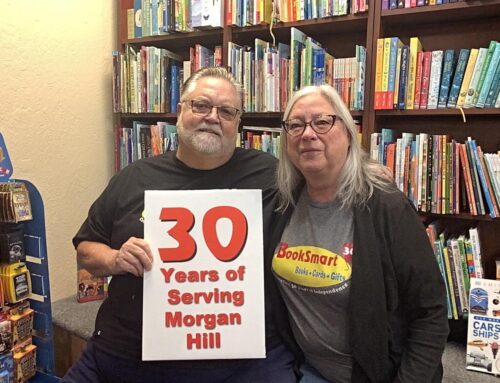The rodeo grew from just a small idea of possibility to a local community event for all ages
![]()
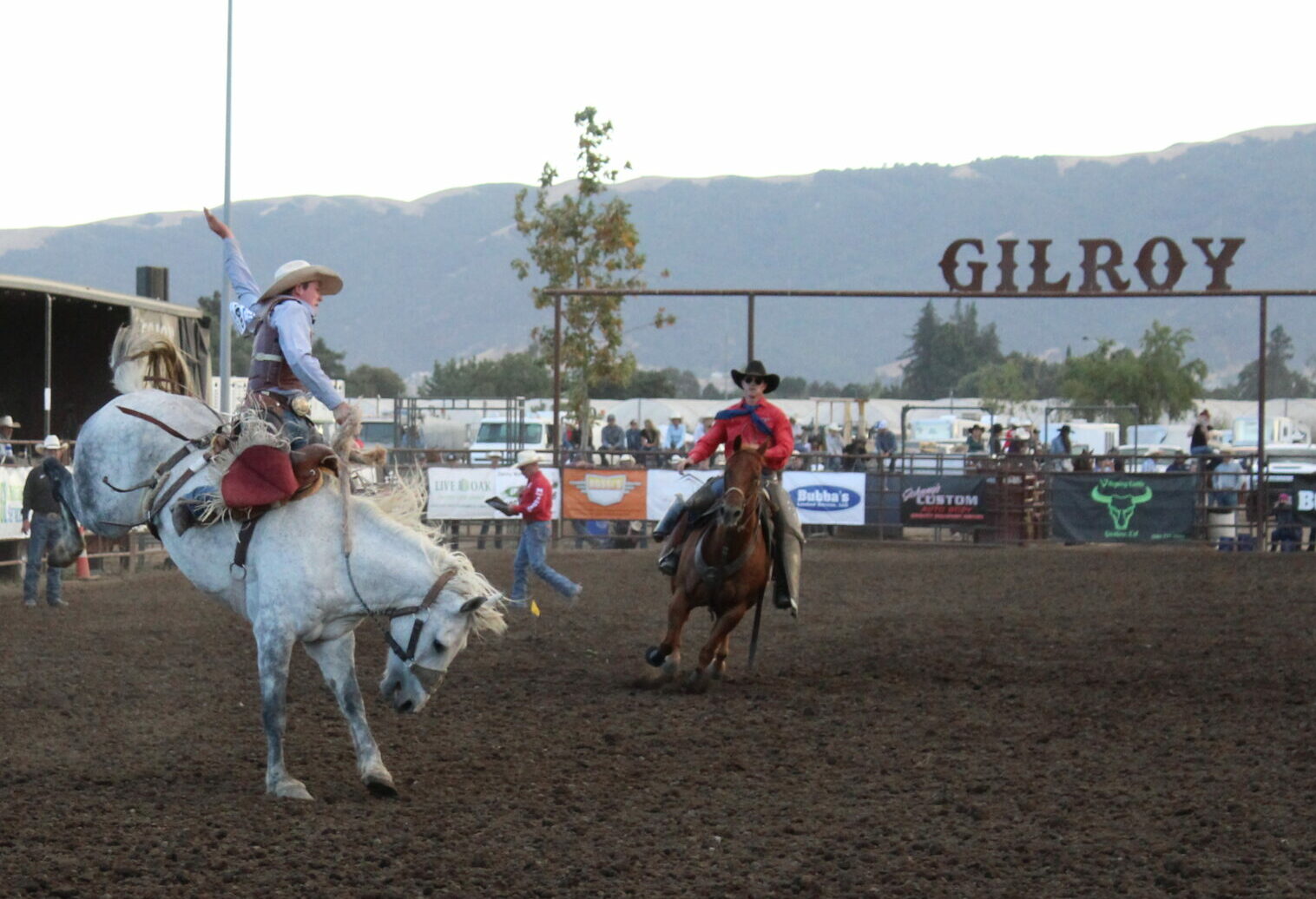
A cowboy hangs on for dear life as he rides a wildly bucking horse during the saddle bronc event at the Gilroy Rodeo on Friday, Aug. 11. Photo by Keira Silver
By Keira Silver
The crowd began to cheer as a group of rodeo queens charged across the dirt arena carrying banners, all sitting poised and graceful atop their galloping horses. The annual Gilroy Rodeo got off to a rousing start Friday, Aug. 11, as a woman sang the National Anthem, followed by a flyover of a plane releasing red, white and blue smoke trails.
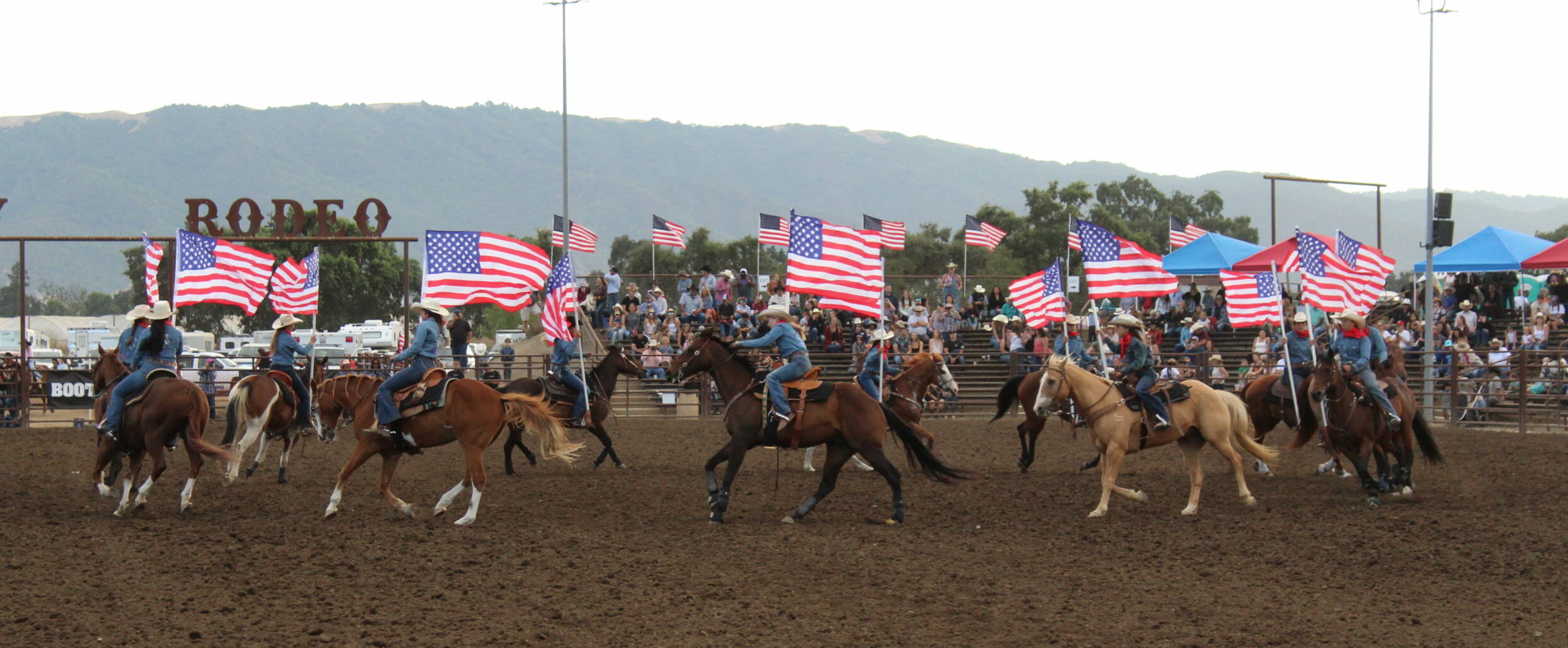
A team of women horseriders form a circle in the Gilroy Rodeo arena as they display the Stars and Stripes during the National Anthem. Photo by Keira Silver
The first main event soon started. Cowboys clung tight to wildly bucking horses. The cheers and screams of the crowd sitting on metal bleachers pulsated through the early evening. The rodeo fans came not just for the locally renowned garlic fries, but also for a chance to witness prime Western heritage. As the sun began to set behind the mountains, the wind kicked up the smell of horses and cooked food. A bass-boosted country song began to play over the many arena speakers, revving up the tempo of the night.
The bull riding followed, men holding tight with their legs. They soon found themselves tossed from the bucking beast’s back and thrown into the dirt. A rodeo clown dressed up in a blue suit drew the animal away as the crowd’s applause erupted for each cowboy’s attempt at an eight-second ride. As the shadows of dusk crossed the valley, a chill crept in the night air and the arena lights came on.
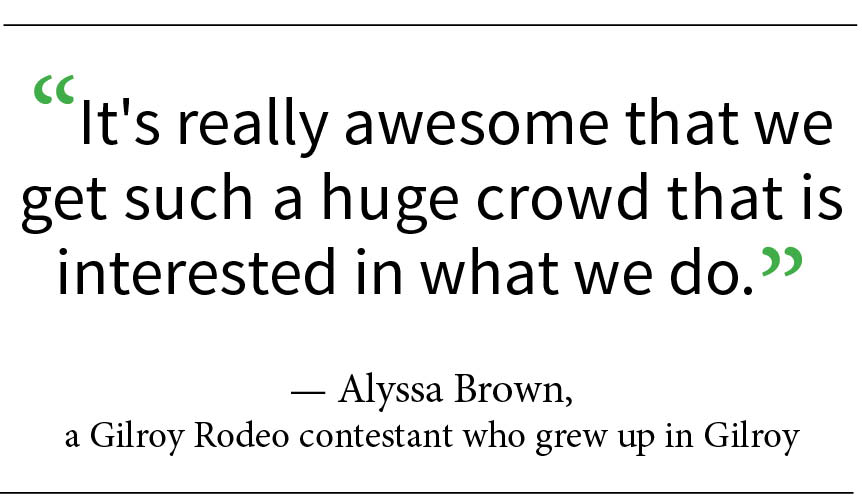 The Gilroy Rodeo has become a weekend of country fun for the locals of the region. With more than 200 contestants, the event has something for everyone. For lifelong cowgirl Alyssa Brown, the sights, sounds and community spirit of the rodeo highlight “a lifestyle that so many people don’t really see very often anymore, but it’s such a prevalent part of this community.”
The Gilroy Rodeo has become a weekend of country fun for the locals of the region. With more than 200 contestants, the event has something for everyone. For lifelong cowgirl Alyssa Brown, the sights, sounds and community spirit of the rodeo highlight “a lifestyle that so many people don’t really see very often anymore, but it’s such a prevalent part of this community.”
Brown grew up in Gilroy and lives on the rodeo grounds. She has been competing and working at the rodeo for three years.
“I’ve rodeoed my whole life,” she said. “It’s always been what I’ve done.”
With the closure of the Gilroy Garlic Festival, the rodeo serves as an extremely important social gathering for the community, she said. It also displays the ranching culture of the South Valley since the pioneer days of the mid-1800s.
“It highlights the Western heritage and the lifestyle that so many of us around here live and are so passionate about,” she said. “I think it’s just a really important thing for the community.”
The Gilroy Rodeo has become one of the largest California Cowboys Professional Rodeo Association rodeos in the state, she said. Attracting numerous men, women and children excited about watching the thrilling sport from yesteryears, the event impacts everyone who works there.
“It’s really awesome that we get such a huge crowd that is interested in what we do,” Brown said.
Brown contributes to the year-round preparation for the rodeo, along with a team of 10 board directors who each have facilities-type jobs.
“We all kind of collaborate together, but there’s so many people that make it happen,” she said. “It’s really just manpower.”
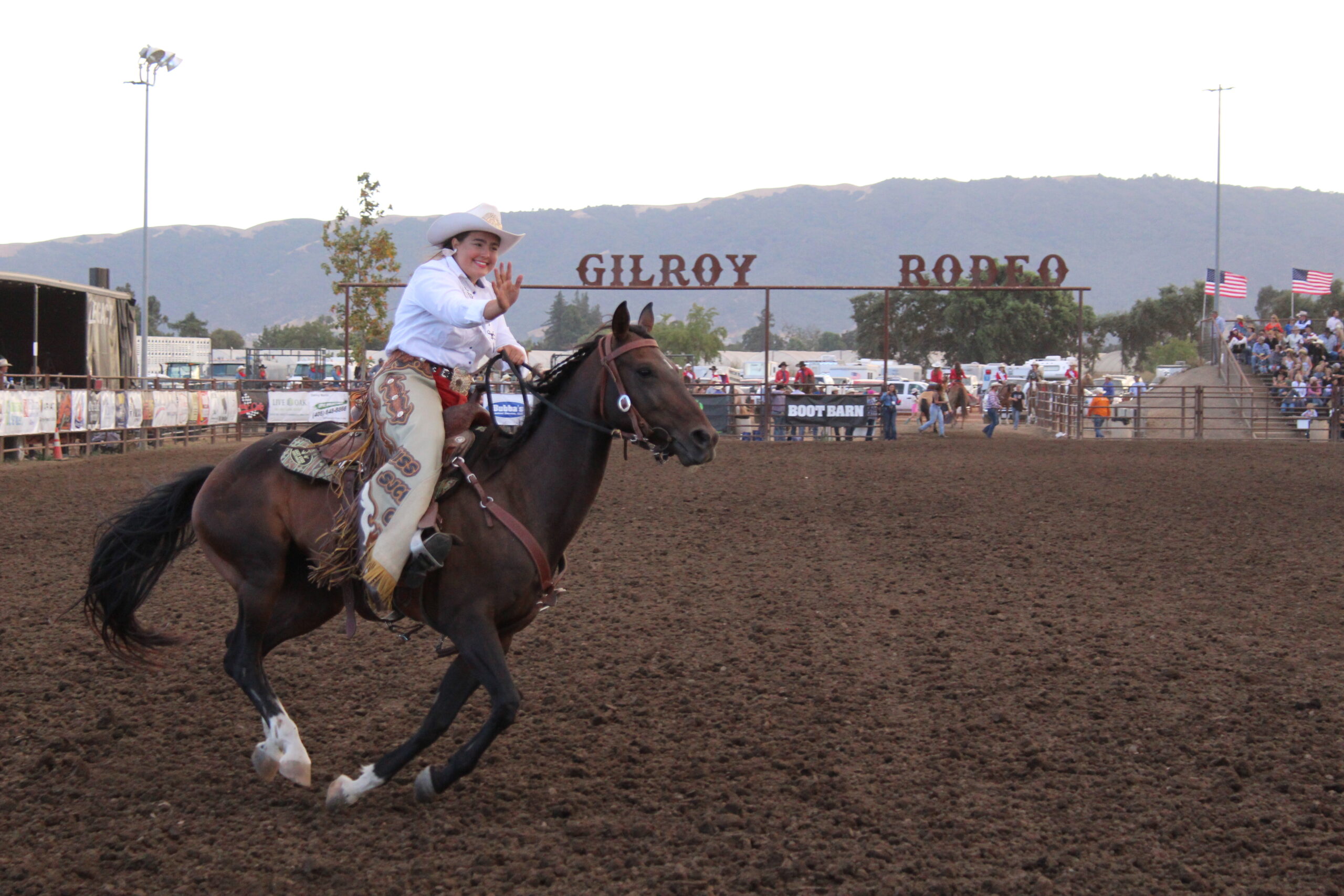
A cowgirl waves at fans as she rides in the arena. Photos by Keira Silver
Money from the event goes back into the community. Funds raised help South Valley nonprofits including: Gilroy FFA Boosters, Adams 4-H, Gilroy Gator Swim Team, South Valley Community Church, Live Oak High School Band, St. Mary’s School, Gilroy Pop Warner, and Gilroy Foundation.
Gabrielle Davis, a two-year rodeo queen, represents the Gilroy Rodeo. Brianna McDermott serves as the new 2023 Gilroy Rodeo Queen. Both women were joined by 13 queens from other rodeos across the state. Each promoted their own rodeo as they assisted in the Gilroy event, Davis said.
“A rodeo queen is an ambassador for our small-town rodeo,” she said. “We go out, we visit other rodeos, we promote our own rodeo.”
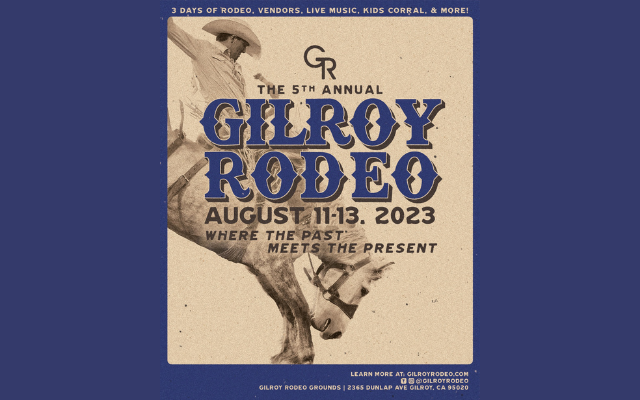 As a first-year queen, McDermott said she’s excited to represent the Gilroy Rodeo and bring the community together. She wants it to be fun for everyone and encourage more people to experience the entertainment next year.
As a first-year queen, McDermott said she’s excited to represent the Gilroy Rodeo and bring the community together. She wants it to be fun for everyone and encourage more people to experience the entertainment next year.
The queens are a part of the grand entry, the mutton busting, and the Kick’n Cancer fundraiser. The women go through the stands carrying cowboy boots.
“You pass the boot through the crowds and fill the boot with money,” Davis said.
Both women had to undergo tryouts to achieve the honor. From horse knowledge to presenting to being tested on local and rodeo history, they found themselves tested on their knowledge, riding skills and communication style.
“You have to do a pattern on your horse, and then you have to carry a flag and also do a presentation wave,” Davis said. “But during that you’re also being judged for how well you can control your horse, how well you can do all the maneuvers.”
Davis and McDermott understand what it requires to be chosen as rodeo royalty and how long the process takes.
“Always go after what you want,” Davis said. “It took me five years to become this queen. I tried out five years in a row.”
The best way to prepare for the role is by setting up for success, McDermott said.
“Keep pushing, set goals, achieve those goals,” she said. “Don’t give up.”
All the queens are there to help each other out in their rodeo responsibilities, especially with traveling between cities.
“We’re a tight-knit, little community,” Davis said.
Erik Martin, president and founder of the Gilroy Rodeo, believes the event is well connected to the local residents. With helpful board directors, the community rallied behind its creation, he said.
“I had a crazy idea about having a rodeo in our backyard,” he said. “I think that it gives an opportunity for people who are interested in this kind of lifestyle and the Western heritage, to have a place to do it.”
The rodeo provides major benefits for the South Valley. Gilroy residents, in return, have stepped up to offer help when needed, he said.
Martin’s favorite part of the rodeo is the impact it has had on the youth. Most of the teenagers are family friends or locals who help with preparing for the rodeo.
“We have a bunch of maybe 15- to 17-year-old kids who are really the backbone of the setup of this rodeo,” he said. “They work some long days and they really… grow up a lot over the two to three weeks getting ready for the rodeo down here.”
Martin knows that the story of how the rodeo came to be resonates with the kids who help make the rodeo happen. He believes it’s important for the youth to realize they can start “something from nothing.”
“I just love seeing the young kids develop and understand what’s possible,” he said. “Here we are having a rodeo in our backyard in a town that didn’t have a rodeo for 62 years, and it was because a bunch of people decided to do it . . . Can you start something from nothing? A lot of people think you can’t, and all these kids know you can.”
The connection to local family, friends, and residents is what makes the Gilroy Rodeo special, Martin believes. It tries to have something for everyone. His favorite memory is when he got the permits he needed from the city. Community support helped speed up the process.
Another favorite memory is when the rodeo got its own flag team made up of locals. The rodeo’s other events and teams have also grown over the years.
“You’re seeing it develop on its own, and other people are getting involved, and it’s kind of getting its own traction,” Martin said. “I like to see people get a hold of something and go for it. We’re here to give them what they need . . . They put the work in and see the results.”
Keira Silver is a senior at Christopher High School. Morgan Hill Life publisher Marty Cheek mentored her on this story.




